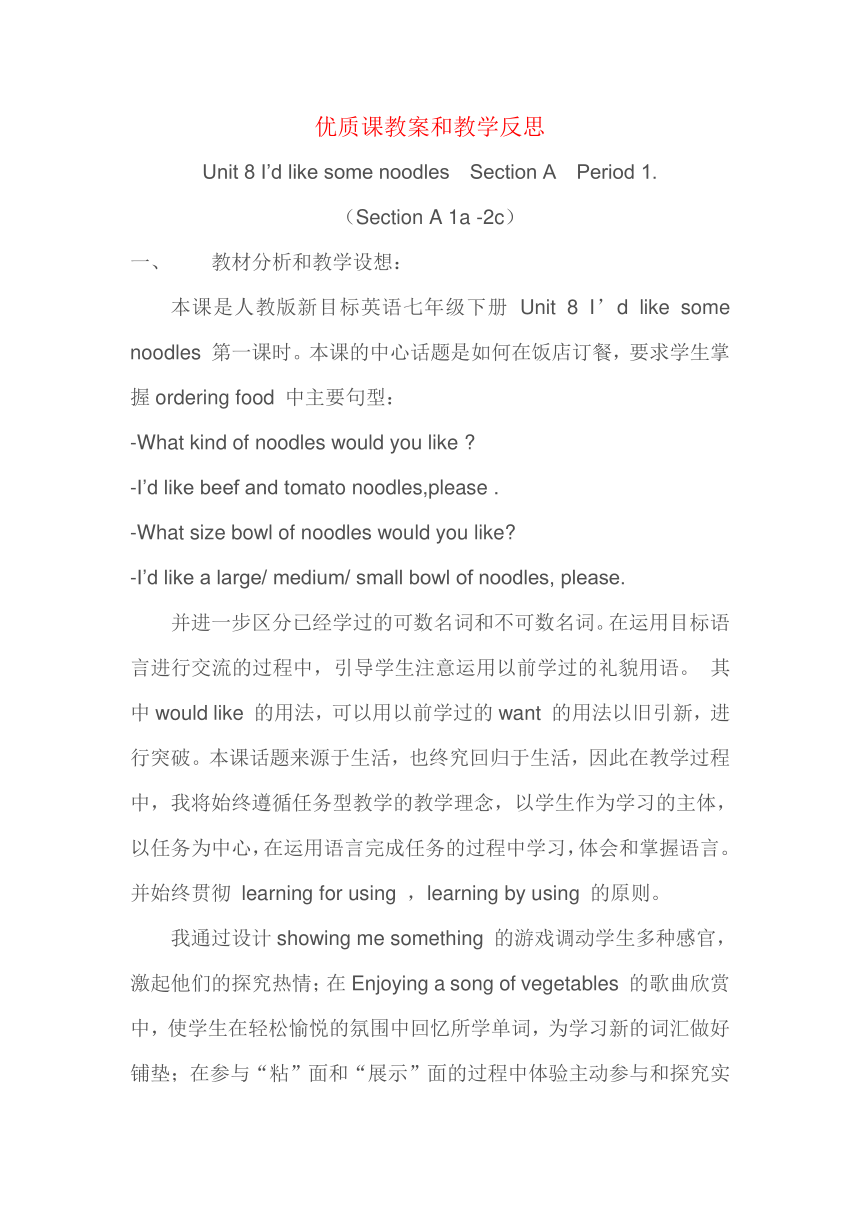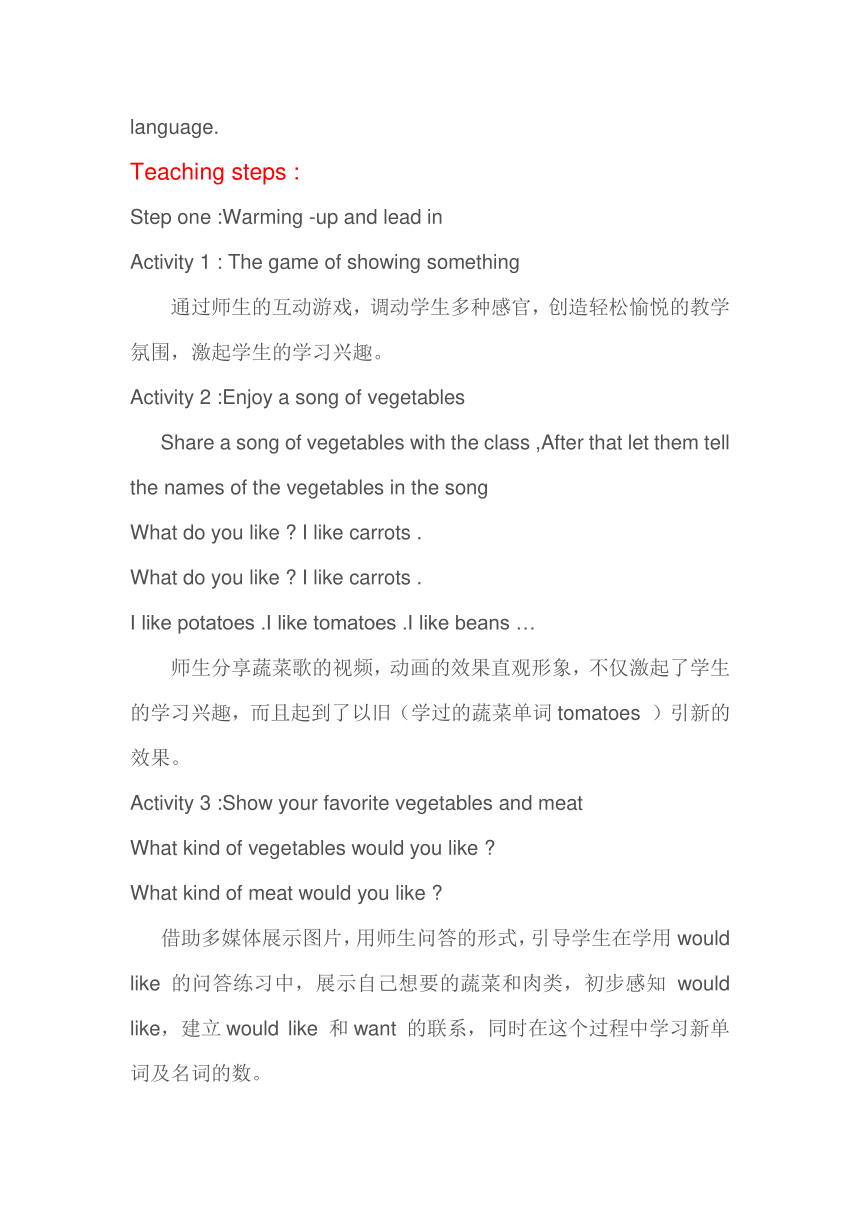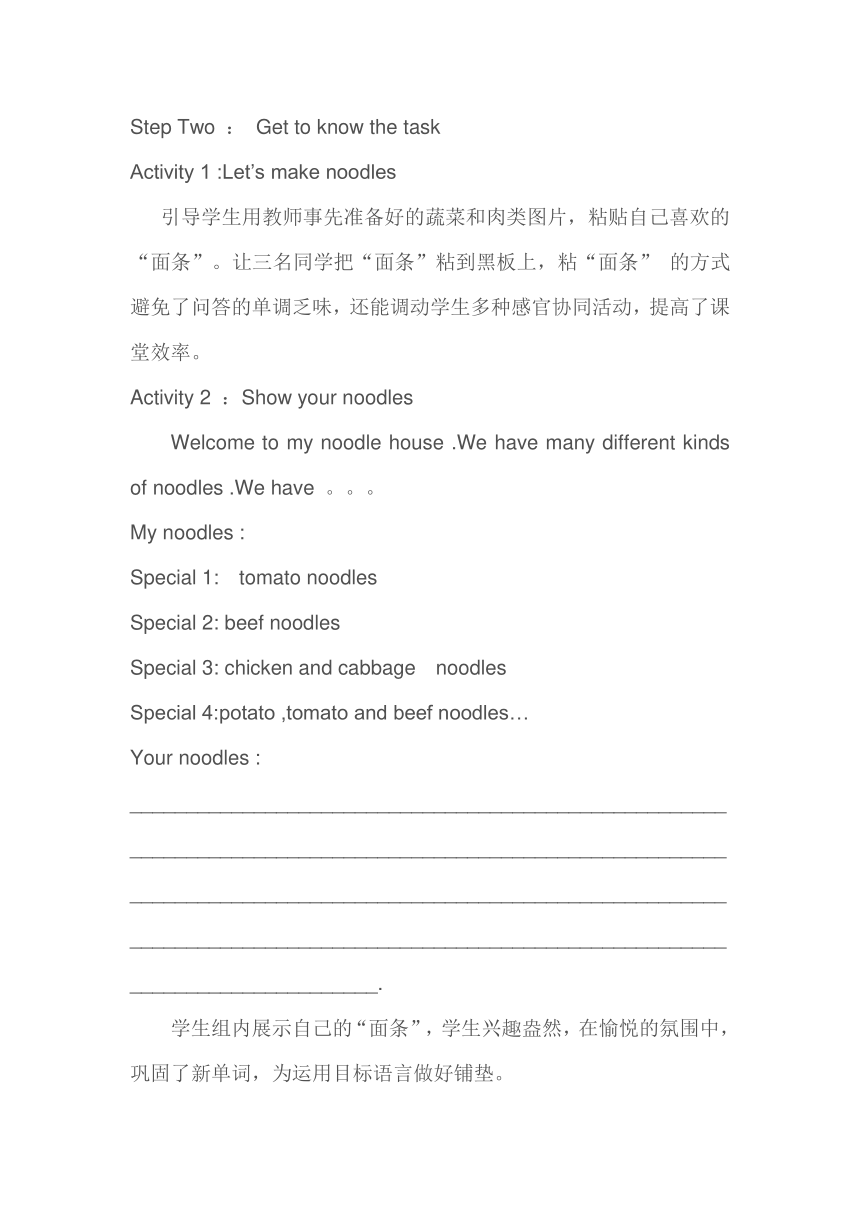Unit 8 I’d like some noodles.(Section A Period 1)优秀教案
文档属性
| 名称 | Unit 8 I’d like some noodles.(Section A Period 1)优秀教案 |  | |
| 格式 | zip | ||
| 文件大小 | 17.0KB | ||
| 资源类型 | 教案 | ||
| 版本资源 | 人教新目标(Go for it)版 | ||
| 科目 | 英语 | ||
| 更新时间 | 2012-04-28 18:03:13 | ||
图片预览





文档简介
优质课教案和教学反思
Unit 8 I’d like some noodles Section A Period 1.
(Section A 1a -2c)
一、 教材分析和教学设想:
本课是人教版新目标英语七年级下册 Unit 8 I’d like some noodles 第一课时。本课的中心话题是如何在饭店订餐,要求学生掌握ordering food 中主要句型:
-What kind of noodles would you like
-I’d like beef and tomato noodles,please .
-What size bowl of noodles would you like
-I’d like a large/ medium/ small bowl of noodles, please.
并进一步区分已经学过的可数名词和不可数名词。在运用目标语言进行交流的过程中,引导学生注意运用以前学过的礼貌用语。 其中would like 的用法,可以用以前学过的want 的用法以旧引新,进行突破。本课话题来源于生活,也终究回归于生活,因此在教学过程中,我将始终遵循任务型教学的教学理念,以学生作为学习的主体,以任务为中心,在运用语言完成任务的过程中学习,体会和掌握语言。并始终贯彻 learning for using ,learning by using 的原则。
我通过设计showing me something 的游戏调动学生多种感官,激起他们的探究热情;在Enjoying a song of vegetables 的歌曲欣赏中,使学生在轻松愉悦的氛围中回忆所学单词,为学习新的词汇做好铺垫;在参与“粘”面和“展示”面的过程中体验主动参与和探究实践的乐趣;在Guessing game 中运用自己的生活经验和丰富的想象力运用所学知识;在welcome to my noodle house 环节中,学生通过在自己的“面馆”中与“顾客”的交流,在角色扮演的过程中体验,实现语言技能到语言能力的转换。
总之,从学生的兴趣和生活经验出发,设计多样的课堂任务活动,使学生在参与活动的过程成为主动思考,大胆实践的主体。在完成活动任务的过程中,培养学生搜集信息和处理信息的能力、自主学习的意识和能力、团队意识和合作精神,从而实现教学方式和学习方式的转变。
二、学情分析
经过七年级上学期的学习,学生已经掌握了一些基本的日常用语,能够用英语很流畅的交流信息,表达喜好和情感。有了解异国文化,习俗的强烈愿望。在英语学习中,他们能够积极参与和合作,有共同完成各种任务的意识。这为本节课任务活动的开展奠定了基础。
但学生在知识方面,缺少丰富的语言基础,对某些任务的完成有一定的难度;在思维能力方面,虽有较强的记忆力和模仿能力,但知识扩展运用的能力尚有待培养;在参与方面,大多数学生有较强的求知欲和表现欲,但部分学生存在不自信、羞于表现等思想顾虑等。
鉴于学生的这些特点,结合新课标、大纲和本单元教材对学生的要求,我确定了本课的教学目标,教学重难点和教学策略。
Teaching goals:
Language knowledge :
Vocabularies : would, I’d=I would, noodle, beef, mutton, cabbage, potato, special, drink, large, size, bowl, he’d= he would
Sentences :
-What kind of noodles would you like
-I’d like beef and tomato noodles,please .
-What size bowl of noodles would you like
- I’d like a large/ medium/ small bowl of noodles, please.
Language Skills :
1. Help the students try to know how to order noodles in a noodles house in English
2. Developing the students’ skill in making conversations about ordering noodles in English as well as their listening skills ,using the target English .
3. Help the students express their request about food .
4.Identify countable nouns and uncountable nouns
Learning strategies: Role playing,listening for key words ,guessing .
Culture awareness :Search the internet to know different cultures of noodles
Affective attitude :Try to have a healthy diet ,stay away from junk food .
Important points: vocabularies and sentences
Difficult points : Try to order food in English using the target language.
Teaching steps :
Step one :Warming -up and lead in
Activity 1 : The game of showing something
通过师生的互动游戏,调动学生多种感官,创造轻松愉悦的教学氛围,激起学生的学习兴趣。
Activity 2 :Enjoy a song of vegetables
Share a song of vegetables with the class ,After that let them tell the names of the vegetables in the song
What do you like I like carrots .
What do you like I like carrots .
I like potatoes .I like tomatoes .I like beans …
师生分享蔬菜歌的视频,动画的效果直观形象,不仅激起了学生的学习兴趣,而且起到了以旧(学过的蔬菜单词tomatoes )引新的效果。
Activity 3 :Show your favorite vegetables and meat
What kind of vegetables would you like
What kind of meat would you like
借助多媒体展示图片,用师生问答的形式,引导学生在学用would like 的问答练习中,展示自己想要的蔬菜和肉类,初步感知would like,建立would like 和want 的联系,同时在这个过程中学习新单词及名词的数。
Step Two : Get to know the task
Activity 1 :Let’s make noodles
引导学生用教师事先准备好的蔬菜和肉类图片,粘贴自己喜欢的“面条”。让三名同学把“面条”粘到黑板上,粘“面条” 的方式避免了问答的单调乏味,还能调动学生多种感官协同活动,提高了课堂效率。
Activity 2 :Show your noodles
Welcome to my noodle house .We have many different kinds of noodles .We have 。。。
My noodles :
Special 1: tomato noodles
Special 2: beef noodles
Special 3: chicken and cabbage noodles
Special 4:potato ,tomato and beef noodles…
Your noodles :
__________________________________________________________________________________________________________________________________________________________________________________________________________________________________________.
学生组内展示自己的“面条”,学生兴趣盎然,在愉悦的氛围中,巩固了新单词,为运用目标语言做好铺垫。
Step 3 :While –task
Activity 1 :Ask and answer
Ask and answer in pairs ,try to know what kind of noodles would their partners like
通过控制性机机械操练,引导学生熟记目标语言。
Activity 2: Challenges
教师用多媒体呈现公众喜欢的面条种类,学生强答,展示对话。 通过半控制式的意义操练,进一步巩固目标语言。
Activity 3: Listening practice
此听力活动中出现了目标语言What kind of noodles would you like I’d like …,而且该活动为学生感知、体验新的语言结构提供了很好的语境。通过点拨,让学生在听的过程中,学会抓住关键词,这样,学生的听力得到很好训练。跟读录音的训练又很好的纠正了学生的语音和语调。
Activity 4:A guessing game
What kind of noodles would \ wouldn't Tangseng like
该环节给学生想象力的发挥提供了空间,在运用目标语言的同时,学生的思维也得以训练。而且游戏就像课堂的兴奋剂,使学生始终处于兴奋状态。
A tip
1.I’d like some potatoes .(土豆)
2. I’d like beef and potato noodles .(牛肉土豆面)
potato and beef noodles 中的“potato ”是名词作定语修饰名词用单数形式,只把被修饰的名词变成复数即可。
Activity 5 :Do some exercises
1. Identify the nouns
2. Choose the best answer
Activity 6 : Another language goal
Learn :What size bowl of noodles would you like By repeating after the teacher ,by asking and answering , by a guessing game .
Step 4 “Post –task
Activity 1 : Make a survey and give a report
-What kind of noodles would you like
-I’d like chicken and cabbage noddles .
-What size bowl of noodles would you like
-I’d like a small bowl of noodles .
S1:
S2:
Name What kind of noodles What size bowl of noodles
Me
S1
S2
Write a report :
I’d like …noodles .I’d like a …bowl of noodles . He’d/She’d like…noodles.He\she’d like a …bowl …
开放的课堂调查活动激发了学生的参与热情,生生之间信息差的存在,为make a survey 提供了可能,在这种氛围下,学生积极参与语言运用和交流。Make a survey 后的give a report 对学生的调查的反馈,避免了学生只图热闹而毫无所获的弊端。
Activity 2 : listen and fill in the blanks
Waiter :What size bowl of noodles would you like
Boy :I’d like a _____ bowl of noodles .
Waiter :And what kind of noodles would you like
Boy: I’d like _____ ,_____ and _______ noodles.
Waiter:And how about you
Girl :I’d like a _______ bowl .
Waiter :What kind would you like
Girl :I’d like _____ and ______ noodles, please .
通过听力练习,引导学生在具体的情境中感知,运用目标语言,进行足量的语言输入,为后面的make a dialogue 提供了范例,而且在听的过程中,学生逐步学会处理所听信息,实现对信息的筛选加工。
Activity 3 :Make a dialogue and act it out
The structures :
1.Can I help you Yes ,please .I’d like ….
2.-What kind of noodles would you like
-I’d like …
3.-What size bowl of noodles …
-I’d like a large\medium\small bowl…
4.Wait a moment ,please .(请稍等)。
5.How much is it It is …
6.Here’s the money .(给钱)
在前面Welcome to my noodles house,show your noodles 环节,学生已经分享了各自面馆的特色面,此环节让学生编写服务生与顾客,服务生与厨师之间的对话。学生编写对话,表演对话的过程是学生运用本课的目标语言进行自由式交际性操练的过程,实现learning for using .
这是本课的一个标志性语言输出,充分体现出语言的交际性和人文性。在这个过程中我重视学生的个性发展,发展他们的创造思维。培养学生语言综合运用能力,同时也是语言技能转换成语言运用能力的过程。这是本课任务完成的集中体现。
Activity 4 :Make a summary. (小结)
Language goal (语言目标)
1.What kind of noodles would you like
I’d like beef and tomato noodles ,please .
2.What size bowl of noodles would you like
I’d like a small\medium\large bowl of noodles .
1.would like 意为想要,愿意,相当于want,用于提出要求或建议,但语气比want委婉。
2.would 是情态动词,没有人称和数的变化,可与人称代词缩写为’d.I’d =I would He’d =He would she’d =she would
Activity 5 :Food culture
China has a long history of noodles .There are many different kinds of noodles .People usually eat noodles on their birthdays .It may bring them long life (长寿)。
On your parents’ birthdays,would you like cook a bowl of noodles for them
It is junk food .(垃圾食品)Don’t eat too much .
Homework :
Make a survey and write a report
Enjoy the song
“An apple a day ,keeps the doctor away”
教学反思:
一、闪光点:
1.在材料的选择方面:能够做到贴近学生,贴近生活,有利于激起学生的参与热情: 歌曲What do you like I like tomatoes . I like tomatoes .I like potatoes ,I like beans .激起了学生的学习兴趣,引起了学生的共鸣;唐僧这一人物的引入,学生兴趣盎然,在轻松愉悦的氛围中练习了目标语言。
2.在情境的创设方面:本课“ordering food ”这一话题来源于生活,也终究要回归到生活中去。基于这一特点,我创设了让学生用事先准备好的蔬菜和肉类图片”粘”出自己喜欢的“面条” ,以小组为单位展示“面条” ,并介绍自己面馆的“特色面” 。在这样的模拟情境中学生主动实践,独立思考 ,很好的体味并运用了目标语言。在“店主”,“顾客” ,“厨师”的角色扮演中,学生进行自由式交际性操练,实现语言输出,实现语言技能到语言能力的转变。在这一过程中不仅彰显了学生的个性,而且培养了学生的团队精神和合作意识。
3.在课堂活动的组织方面:导课时的“showing me something” 游戏的组织,不仅营造了良好的学习氛围,而且自然的导入了新课;视频的引入使枯燥的单词变的直观形象;“Guessing game”使得学生在猜测唐僧喜欢什么种类的面的过程中,运用了目标语言,同时学生的发散思维能力和想象力得到发展。
二、不足:
1.调查的时机把握仍需加强:我在后面练完了what size bowl of ... 之后,让学生进行调查,无论从调查的时机、可行性和可参与性方面都是不成熟的。调查太简单,是简单的重复。如果能学完第一个句型后就进行调查,这样,调查的真实性和可参与性,信息沟的刺激作用就恰到好处了。后面也可以做一个简单的单一的调查。如能二者相结合,就恰到好处了。
2. 在处理“input”和“output”关系方面做的不好,大量的机械操练是必需的,但要把好度。过多的机械操练,不但会挫伤学生的积极性,而且会使学生停留在表层知识阶段,形不成理性认识,更谈不上运用了。在练what kind of noodles would you like 这个环节,用图片练完了之后,出示了3张练he ,she ,they 的图片 ,现在看来着实是多余。材料的浪费,单一的机械操练模式很容易引起学生的疲惫。
3. 学生思考和顿悟的时间不够充分。教师为了完成自己预设的教学任务,未能留给学生充分思考的时间和充分想象的空间,造成教师“呐喊”,学生“彷徨”的局面。教师包办了太多的事情,而学生则过分依赖老师,这样,学生只能停留在机械模仿阶段,学生越来越懒于思考。
4.教学形式和教学内容仍存在“两张皮”的现象。课堂活动的设计,活动的新颖性固然重要,但更重要的是活动要为教学内容服务,适合学生水平,否则,活动只能流于形式。
每次“磨课”都是一次“地狱”和“炼狱”的过程,有汗水,也有收获,这次优质课评选,我留下了很多遗憾,if I gave them more time to speak ,to communicate ,to use ,they would ...,If I designed the activities ,they would ...但生活没有太多的如果,对于我来说,只有经过“地狱”和“炼狱”,才会有真正的“天堂”。
Unit 8 I’d like some noodles Section A Period 1.
(Section A 1a -2c)
一、 教材分析和教学设想:
本课是人教版新目标英语七年级下册 Unit 8 I’d like some noodles 第一课时。本课的中心话题是如何在饭店订餐,要求学生掌握ordering food 中主要句型:
-What kind of noodles would you like
-I’d like beef and tomato noodles,please .
-What size bowl of noodles would you like
-I’d like a large/ medium/ small bowl of noodles, please.
并进一步区分已经学过的可数名词和不可数名词。在运用目标语言进行交流的过程中,引导学生注意运用以前学过的礼貌用语。 其中would like 的用法,可以用以前学过的want 的用法以旧引新,进行突破。本课话题来源于生活,也终究回归于生活,因此在教学过程中,我将始终遵循任务型教学的教学理念,以学生作为学习的主体,以任务为中心,在运用语言完成任务的过程中学习,体会和掌握语言。并始终贯彻 learning for using ,learning by using 的原则。
我通过设计showing me something 的游戏调动学生多种感官,激起他们的探究热情;在Enjoying a song of vegetables 的歌曲欣赏中,使学生在轻松愉悦的氛围中回忆所学单词,为学习新的词汇做好铺垫;在参与“粘”面和“展示”面的过程中体验主动参与和探究实践的乐趣;在Guessing game 中运用自己的生活经验和丰富的想象力运用所学知识;在welcome to my noodle house 环节中,学生通过在自己的“面馆”中与“顾客”的交流,在角色扮演的过程中体验,实现语言技能到语言能力的转换。
总之,从学生的兴趣和生活经验出发,设计多样的课堂任务活动,使学生在参与活动的过程成为主动思考,大胆实践的主体。在完成活动任务的过程中,培养学生搜集信息和处理信息的能力、自主学习的意识和能力、团队意识和合作精神,从而实现教学方式和学习方式的转变。
二、学情分析
经过七年级上学期的学习,学生已经掌握了一些基本的日常用语,能够用英语很流畅的交流信息,表达喜好和情感。有了解异国文化,习俗的强烈愿望。在英语学习中,他们能够积极参与和合作,有共同完成各种任务的意识。这为本节课任务活动的开展奠定了基础。
但学生在知识方面,缺少丰富的语言基础,对某些任务的完成有一定的难度;在思维能力方面,虽有较强的记忆力和模仿能力,但知识扩展运用的能力尚有待培养;在参与方面,大多数学生有较强的求知欲和表现欲,但部分学生存在不自信、羞于表现等思想顾虑等。
鉴于学生的这些特点,结合新课标、大纲和本单元教材对学生的要求,我确定了本课的教学目标,教学重难点和教学策略。
Teaching goals:
Language knowledge :
Vocabularies : would, I’d=I would, noodle, beef, mutton, cabbage, potato, special, drink, large, size, bowl, he’d= he would
Sentences :
-What kind of noodles would you like
-I’d like beef and tomato noodles,please .
-What size bowl of noodles would you like
- I’d like a large/ medium/ small bowl of noodles, please.
Language Skills :
1. Help the students try to know how to order noodles in a noodles house in English
2. Developing the students’ skill in making conversations about ordering noodles in English as well as their listening skills ,using the target English .
3. Help the students express their request about food .
4.Identify countable nouns and uncountable nouns
Learning strategies: Role playing,listening for key words ,guessing .
Culture awareness :Search the internet to know different cultures of noodles
Affective attitude :Try to have a healthy diet ,stay away from junk food .
Important points: vocabularies and sentences
Difficult points : Try to order food in English using the target language.
Teaching steps :
Step one :Warming -up and lead in
Activity 1 : The game of showing something
通过师生的互动游戏,调动学生多种感官,创造轻松愉悦的教学氛围,激起学生的学习兴趣。
Activity 2 :Enjoy a song of vegetables
Share a song of vegetables with the class ,After that let them tell the names of the vegetables in the song
What do you like I like carrots .
What do you like I like carrots .
I like potatoes .I like tomatoes .I like beans …
师生分享蔬菜歌的视频,动画的效果直观形象,不仅激起了学生的学习兴趣,而且起到了以旧(学过的蔬菜单词tomatoes )引新的效果。
Activity 3 :Show your favorite vegetables and meat
What kind of vegetables would you like
What kind of meat would you like
借助多媒体展示图片,用师生问答的形式,引导学生在学用would like 的问答练习中,展示自己想要的蔬菜和肉类,初步感知would like,建立would like 和want 的联系,同时在这个过程中学习新单词及名词的数。
Step Two : Get to know the task
Activity 1 :Let’s make noodles
引导学生用教师事先准备好的蔬菜和肉类图片,粘贴自己喜欢的“面条”。让三名同学把“面条”粘到黑板上,粘“面条” 的方式避免了问答的单调乏味,还能调动学生多种感官协同活动,提高了课堂效率。
Activity 2 :Show your noodles
Welcome to my noodle house .We have many different kinds of noodles .We have 。。。
My noodles :
Special 1: tomato noodles
Special 2: beef noodles
Special 3: chicken and cabbage noodles
Special 4:potato ,tomato and beef noodles…
Your noodles :
__________________________________________________________________________________________________________________________________________________________________________________________________________________________________________.
学生组内展示自己的“面条”,学生兴趣盎然,在愉悦的氛围中,巩固了新单词,为运用目标语言做好铺垫。
Step 3 :While –task
Activity 1 :Ask and answer
Ask and answer in pairs ,try to know what kind of noodles would their partners like
通过控制性机机械操练,引导学生熟记目标语言。
Activity 2: Challenges
教师用多媒体呈现公众喜欢的面条种类,学生强答,展示对话。 通过半控制式的意义操练,进一步巩固目标语言。
Activity 3: Listening practice
此听力活动中出现了目标语言What kind of noodles would you like I’d like …,而且该活动为学生感知、体验新的语言结构提供了很好的语境。通过点拨,让学生在听的过程中,学会抓住关键词,这样,学生的听力得到很好训练。跟读录音的训练又很好的纠正了学生的语音和语调。
Activity 4:A guessing game
What kind of noodles would \ wouldn't Tangseng like
该环节给学生想象力的发挥提供了空间,在运用目标语言的同时,学生的思维也得以训练。而且游戏就像课堂的兴奋剂,使学生始终处于兴奋状态。
A tip
1.I’d like some potatoes .(土豆)
2. I’d like beef and potato noodles .(牛肉土豆面)
potato and beef noodles 中的“potato ”是名词作定语修饰名词用单数形式,只把被修饰的名词变成复数即可。
Activity 5 :Do some exercises
1. Identify the nouns
2. Choose the best answer
Activity 6 : Another language goal
Learn :What size bowl of noodles would you like By repeating after the teacher ,by asking and answering , by a guessing game .
Step 4 “Post –task
Activity 1 : Make a survey and give a report
-What kind of noodles would you like
-I’d like chicken and cabbage noddles .
-What size bowl of noodles would you like
-I’d like a small bowl of noodles .
S1:
S2:
Name What kind of noodles What size bowl of noodles
Me
S1
S2
Write a report :
I’d like …noodles .I’d like a …bowl of noodles . He’d/She’d like…noodles.He\she’d like a …bowl …
开放的课堂调查活动激发了学生的参与热情,生生之间信息差的存在,为make a survey 提供了可能,在这种氛围下,学生积极参与语言运用和交流。Make a survey 后的give a report 对学生的调查的反馈,避免了学生只图热闹而毫无所获的弊端。
Activity 2 : listen and fill in the blanks
Waiter :What size bowl of noodles would you like
Boy :I’d like a _____ bowl of noodles .
Waiter :And what kind of noodles would you like
Boy: I’d like _____ ,_____ and _______ noodles.
Waiter:And how about you
Girl :I’d like a _______ bowl .
Waiter :What kind would you like
Girl :I’d like _____ and ______ noodles, please .
通过听力练习,引导学生在具体的情境中感知,运用目标语言,进行足量的语言输入,为后面的make a dialogue 提供了范例,而且在听的过程中,学生逐步学会处理所听信息,实现对信息的筛选加工。
Activity 3 :Make a dialogue and act it out
The structures :
1.Can I help you Yes ,please .I’d like ….
2.-What kind of noodles would you like
-I’d like …
3.-What size bowl of noodles …
-I’d like a large\medium\small bowl…
4.Wait a moment ,please .(请稍等)。
5.How much is it It is …
6.Here’s the money .(给钱)
在前面Welcome to my noodles house,show your noodles 环节,学生已经分享了各自面馆的特色面,此环节让学生编写服务生与顾客,服务生与厨师之间的对话。学生编写对话,表演对话的过程是学生运用本课的目标语言进行自由式交际性操练的过程,实现learning for using .
这是本课的一个标志性语言输出,充分体现出语言的交际性和人文性。在这个过程中我重视学生的个性发展,发展他们的创造思维。培养学生语言综合运用能力,同时也是语言技能转换成语言运用能力的过程。这是本课任务完成的集中体现。
Activity 4 :Make a summary. (小结)
Language goal (语言目标)
1.What kind of noodles would you like
I’d like beef and tomato noodles ,please .
2.What size bowl of noodles would you like
I’d like a small\medium\large bowl of noodles .
1.would like 意为想要,愿意,相当于want,用于提出要求或建议,但语气比want委婉。
2.would 是情态动词,没有人称和数的变化,可与人称代词缩写为’d.I’d =I would He’d =He would she’d =she would
Activity 5 :Food culture
China has a long history of noodles .There are many different kinds of noodles .People usually eat noodles on their birthdays .It may bring them long life (长寿)。
On your parents’ birthdays,would you like cook a bowl of noodles for them
It is junk food .(垃圾食品)Don’t eat too much .
Homework :
Make a survey and write a report
Enjoy the song
“An apple a day ,keeps the doctor away”
教学反思:
一、闪光点:
1.在材料的选择方面:能够做到贴近学生,贴近生活,有利于激起学生的参与热情: 歌曲What do you like I like tomatoes . I like tomatoes .I like potatoes ,I like beans .激起了学生的学习兴趣,引起了学生的共鸣;唐僧这一人物的引入,学生兴趣盎然,在轻松愉悦的氛围中练习了目标语言。
2.在情境的创设方面:本课“ordering food ”这一话题来源于生活,也终究要回归到生活中去。基于这一特点,我创设了让学生用事先准备好的蔬菜和肉类图片”粘”出自己喜欢的“面条” ,以小组为单位展示“面条” ,并介绍自己面馆的“特色面” 。在这样的模拟情境中学生主动实践,独立思考 ,很好的体味并运用了目标语言。在“店主”,“顾客” ,“厨师”的角色扮演中,学生进行自由式交际性操练,实现语言输出,实现语言技能到语言能力的转变。在这一过程中不仅彰显了学生的个性,而且培养了学生的团队精神和合作意识。
3.在课堂活动的组织方面:导课时的“showing me something” 游戏的组织,不仅营造了良好的学习氛围,而且自然的导入了新课;视频的引入使枯燥的单词变的直观形象;“Guessing game”使得学生在猜测唐僧喜欢什么种类的面的过程中,运用了目标语言,同时学生的发散思维能力和想象力得到发展。
二、不足:
1.调查的时机把握仍需加强:我在后面练完了what size bowl of ... 之后,让学生进行调查,无论从调查的时机、可行性和可参与性方面都是不成熟的。调查太简单,是简单的重复。如果能学完第一个句型后就进行调查,这样,调查的真实性和可参与性,信息沟的刺激作用就恰到好处了。后面也可以做一个简单的单一的调查。如能二者相结合,就恰到好处了。
2. 在处理“input”和“output”关系方面做的不好,大量的机械操练是必需的,但要把好度。过多的机械操练,不但会挫伤学生的积极性,而且会使学生停留在表层知识阶段,形不成理性认识,更谈不上运用了。在练what kind of noodles would you like 这个环节,用图片练完了之后,出示了3张练he ,she ,they 的图片 ,现在看来着实是多余。材料的浪费,单一的机械操练模式很容易引起学生的疲惫。
3. 学生思考和顿悟的时间不够充分。教师为了完成自己预设的教学任务,未能留给学生充分思考的时间和充分想象的空间,造成教师“呐喊”,学生“彷徨”的局面。教师包办了太多的事情,而学生则过分依赖老师,这样,学生只能停留在机械模仿阶段,学生越来越懒于思考。
4.教学形式和教学内容仍存在“两张皮”的现象。课堂活动的设计,活动的新颖性固然重要,但更重要的是活动要为教学内容服务,适合学生水平,否则,活动只能流于形式。
每次“磨课”都是一次“地狱”和“炼狱”的过程,有汗水,也有收获,这次优质课评选,我留下了很多遗憾,if I gave them more time to speak ,to communicate ,to use ,they would ...,If I designed the activities ,they would ...但生活没有太多的如果,对于我来说,只有经过“地狱”和“炼狱”,才会有真正的“天堂”。
同课章节目录
- Unit 1 Can you play the guitar?
- Section A
- Section B
- Unit 2 What time do you go to school?
- Section A
- Section B
- Unit 3 How do you get to school?
- Section A
- Section B
- Unit 4 Don't eat in class.
- Section A
- Section B
- Unit 5 Why do you like pandas?
- Section A
- Section B
- Unit 6 I'm watching TV.
- Section A
- Section B
- Review of Units 1-6
- Unit 7 It's raining!
- Section A
- Section B
- Unit 8 Is there a post office near here?
- Section A
- Section B
- Unit 9 What does he look like?
- Section A
- Section B
- Unit 10 I'd like some noodles.
- Section A
- Section B
- Unit 11 How was your school trip?
- Section A
- Section B
- Unit 12 What did you do last weekend?
- Section A
- Section B
